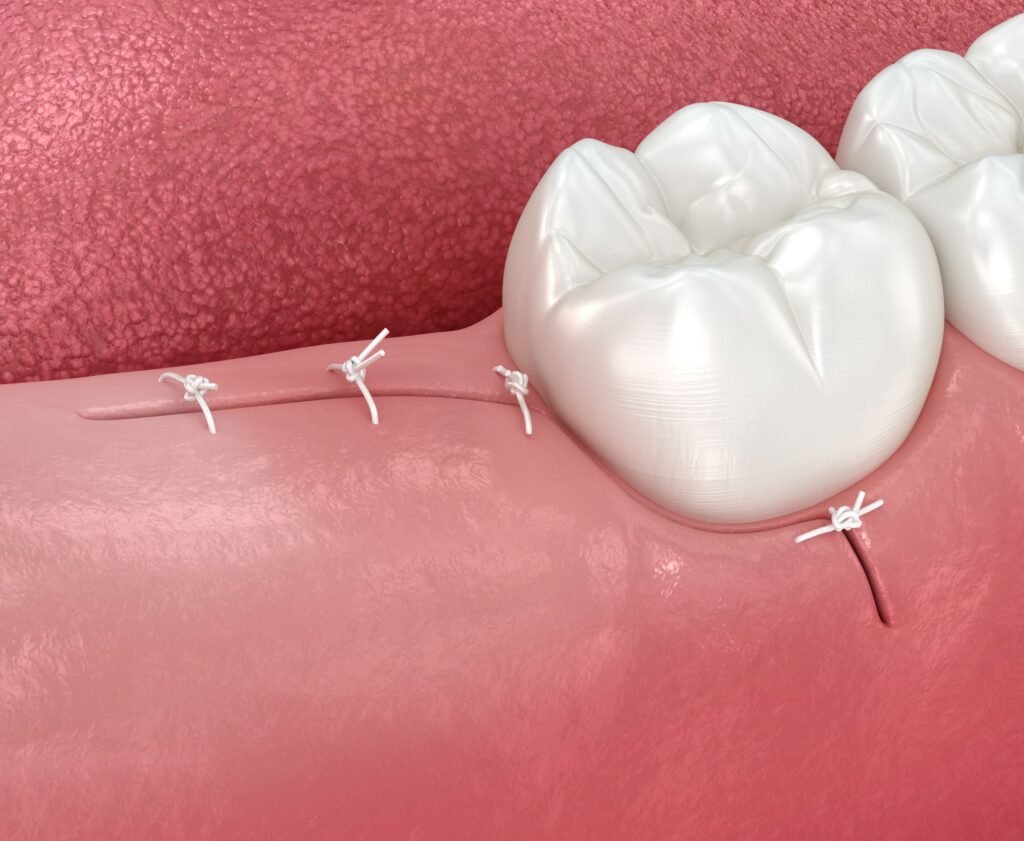
Although our ancestors may have evolved wisdom teeth out of necessity, today, these last molars are considered a vestigial feature. They are no longer required for our survival, and because they so frequently cause oral issues, they’re extracted more often than not.
It’s natural to have questions about what recovery is like following your procedure. For example, you might want to know whether you will need stitches and, if so, whether they will dissolve on their own. Continue reading to learn more!
Will I Require Stitches After Wisdom Tooth Extraction?
These molars arrive years after your other adult teeth have erupted through your gums, which often causes dental problems. For example, they often push neighboring teeth out of alignment if there’s not enough room for them to fit comfortably. Unfortunately, they are also known for becoming trapped in the jawbone, causing aches and infection.
In these instances, your dentist will have to create an opening in your gum tissue and jawbone to access the affected tooth. This can result in bleeding, swelling, and discomfort, and is likely to be penetrated by bacteria in your mouth if the wound isn’t closed. Your dentist might need to place stitches to hold the flaps of tissue together to mend following your procedure.
Will My Stitches Dissolve On Their Own?
Did you know that stitches can be made from a various different materials based on the reason they’re needed? Many of these options are dissolvable, which is ideal for wisdom tooth recovery. Suturing the wound with strings that eventually dissipate on their own saves you and your dentist the trouble of scheduling an additional appointment to cut them away.
What Are Dissolvable Stitches Made From?
It’s easy to assume that all dental sutures are made from the same materials, but that’s not necessarily the case. There are many options, and each has its own unique traits and timeframes for how quickly they dissolve.
Depending on your circumstances, your provider might use one of the following types:
- Gut sutures. These are derived from sheep or cow intestines and are known for their flexibility, which makes them a popular selection. However, they’re not particularly strong and are ideal when the suture doesn’t need to be too tight. They tend to dissolve within 7 to 10 days.
- Chromic gut sutures. These are similar to the previous choice but are treated with chromium salt, which enhances their resistance to bodily fluids and increases their lifespan. As a result, these may last closer to 10 to 14 days before eroding.
- Polyglactin 910 (Vicryl). This synthetic material usually retains its structure longer than the organic options, and so is often ideal for closing oral surgeries. You can expect stitches made from these fibers to last 2 or 3 weeks before they dissipate.
Your dentist will provide post-op instructions for you to follow, which will likely include information on how long you can expect your stitches to last and whether you’ll need a follow-up appointment to remove them.
About the Practice
At Alpharetta Modern Dentistry, you and your family benefit from two dentists who share more than 20 years of combined experience. Dr. Labastida and Dr. Kakadia collaborate to provide a complete array of services to people of all ages at one convenient location, including wisdom teeth extractions. They combine a caring approach with advanced technology to improve patient comfort while delivering accurate results meant to last. Plus, they offer nitrous oxide sedation to help you feel calm during your procedure. You can request an appointment on the website or call (470) 282-5157.
